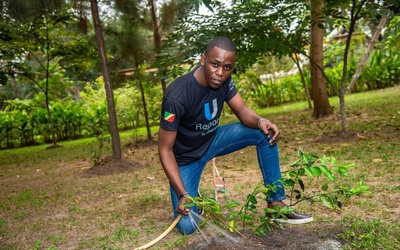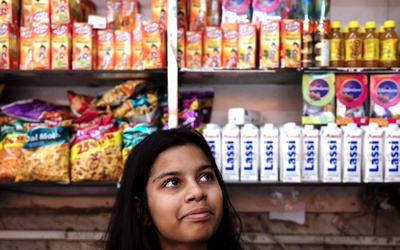U-Report – a free, confidential tool for community participation – is giving an anonymous medium to these young girls and boys in Pakistan to talk openly, ask questions, receive relevant information and take action through the comfort of their mobile phones.
In June 2017, UNICEF WASH and U-Report in Pakistan launched the Menstrual Hygiene Innovation Challenge. The objective of this challenge was to encourage young girls and boys to take action in their communities on menstrual hygiene management. The challenge was launched following the data received through U-Report poll results on menstrual hygiene management, which indicated that 49% of young girls had no knowledge of menstruation prior to their first period. The results further revealed that 23% of girls would most like to learn about menstruation in school.
Further information through live chats showed that U-Reporters want to talk about menstruation and receive the right information. During the 3 hour live chat, 2500 U-Reporters asked questions regarding menstruation without any shame. Questions like ‘Can I take bath during my period’, or ‘Why should girls not play games during periods’ were eye-opening.
“Evidence commissioned by UNICEF has shown that lack of discussion about menstruation in both public and private spaces in Pakistan has left adolescent girls devoid of vital information on what to do when they are on their periods. U-Report is helping the WASH team in Pakistan bridge the gap between research and practice, and bringing us voices of young girls and boys from communities who want to take REAL action!” – Gloria Lihemo, C4D Specialist, WASH UNICEF Pakistan
Feedback from U-Reporters in the recent polls and the type of questions being asked in the one-on-one U-Report MHM chats signified to UNICEF Pakistan Innovation and WASH colleagues that more had to be done enable young people to access critical information.
The Menstrual Hygiene Innovation Challenge is a culmination of the collaborative efforts of the U-Report poll results and data from young girls and boys across the country. U-Report supported UNICEF’s WASH team to communicate with young girls one-on-one and hear their opinions and issues surrounding menstrual hygiene. Based on the feedback and interaction with U-Reporters, valuable insights and perspectives on addressing the challenges surrounding menstrual hygiene were received. We found that young people in Pakistan want to take a lead in improving their communities, especially tackling challenges in areas such as health, hygiene, education – the only thing lacking was an ‘opportunity’ to create a ‘change’.
This challenge was launched as an opportunity for young U-Reporters in Pakistan. A call for proposal was sent out to U-Reporters and young people to submit innovative ideas on tools, models, and services to enable girls and women to manage their menstruation hygienically. UNICEF received 60 proposals of which 7 winners were selected and awarded a grant amount of PKR 50,000, PKR 150,000 and PKR 250,000.
The first prize winners of the challenge – Alizey Sohail, Hina Farooqui, and Ayesha Arshad – will develop the first sanitary napkin vending machine in partnership with local health and wellness brands.
Saba, a young entrepreneur from Karachi who works on animation and artificial intelligence to raise awareness about women’s issues, was also awarded a grant. Through the winning innovation challenge grant and mentorship, Saba will produce animated storytelling content to share what menstruation really is, reduce the stigma and shame around it, and raise awareness regarding menstrual hygiene.
"Shame and taboos make it impossible for women to get access to healthcare. If we want our girls and women to have healthy lives, we need to remove the shame associated with body processes. All of the projects and winners are working hard in their own ways to remove these hurdles. I’m happy to be part of this list.” – Saba Khalid, Founder of Aurat Raaj – Winner of UNICEF Menstrual Hygiene Innovation Challenge
Granaz Balouch was also selected. A teacher from Gwadar, a coastal area in Balochistan, who has designed a unique model to include local communities, youth, civil society members, media as well as district government officials as key stakeholders to ensure greater participation of girls around menstruation. “I am thrilled to receive a UNICEF menstrual hygiene innovation challenge award! Through my project ‘Sehat Appa’ I will use E-Health clinics/Online clinics to reach women and mentor them.” Makkiya Jawwed, Innovation challenge winner from Karachi.
Other winners, Iqra Irfan, Samiullah Khan, and Areena Kamil, three young innovators from NUST School of Engineering and Computer science in Islamabad, will help raise awareness about menstrual hygiene practices through an android phone application. In addition, Naveed Tejani and Farzana Ali will provide girls with a digital platform to track their periods through their unique project OvaryActBot . These innovative solutions from young minds will raise awareness and promote the importance of good menstrual hygiene for girls and women in Pakistan. Marziyya Malik, Programme Manager at School of Leadership says: “With 15 years of experience within the domains of youth development and education in Pakistan, School of Leadership has engaged in various youth development programmes across Pakistan with various partners, however working with UNICEF’s U-Report is different. We are digging deeper and going beyond what meets the eye in understanding the youth of Pakistan – their preferences and their issues so we could deliver creative learning initiatives. Data from the menstrual hygiene poll revealed that many U-Reporters had out-of-the-box ideas through which low-cost and wide outreach interventions for better MHM could be rolled out”.
All the challenge winners were awarded prizes at the launch of UNICEF’s Be Bold, Be Free campaign on 3rd August 2017 in Islamabad. In this colourful event Sana Mahmud, captain of the national basketball team, Hajra Khan, captain of the national football team, and Kiran Khan, an Olympic swimmer, were appointed as menstrual hygiene champions by UNICEF and presented the awards to the challenge winners.








